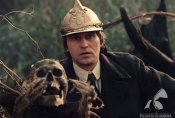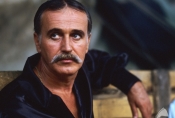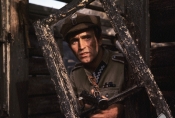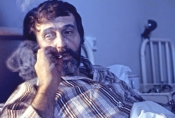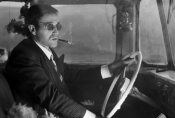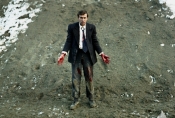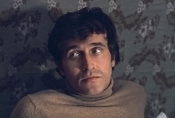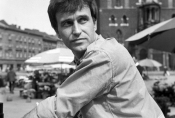Jan Nowicki
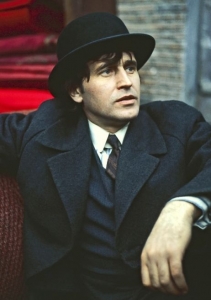
“Freedom is our fundamental value, one every man should strive for. It is crucial to achieve the maximum freedom of choice in one's personal and professional life. I have always tried to be free, even if it meant losing some opportunities along the way – I am also referring to freedom of expression regarding certain opinions,” Jan Nowicki confesses.
He was born on November 5, 1939 in Kowal near Włocławek. A graduate of the Acting Department of the Krakow National Theatre School (1964). Since 1965, he has been associated with the Stary Theatre in Krakow.
He has appeared in over 120 films and television series. He made his debut – while still a student – in Przygoda noworoczna/ A New Year’s Day Adventure (1963) by Stanisław Wohl. His first big role was Captain Wyganowski in Wajda’s adaptation of Popioły/Ashes (1965), a novel by Stefan Żeromski. A year later, he played the main character in Bariera/ Barrier (1966) by Jerzy Skolimowski, the sequel to the latter’s directorial debut, Rysopis/Identification Marks: None (1964), and Walkover (1965), an autobiographical tale about the fate of a young representative of the intelligentsia in the Polish reality of the 1960s, attempting to overcome those barriers that separate him from the world: money, conventions, and hierarchy.
Another interesting performance by Nowicki was Marek, a friend of the son of the main character in Życie rodzinne/Family Life (1970) by Krzysztof Zanussi. In Spirala/Spiral (1978) by the same director, he gave one of his finest performances to date – as a man in his forties whose career is going very well, but who is suffering from an incurable disease. His other memorable roles include: a geologist looking for oil in Dziura w ziemi/A Hole In The Ground (1970) by Andrzej Kondratiuk, the handsome lover in Anatomia miłości/Anatomy of Love (1972) by Roman Załuski, the eponymous card shark in Wielki szu/Big Shar (1982) by Sylwester Chęciński, the eccentric writer in Kraj świata/The Edge of the World (1993), the debut feature film of Maria Zmarz-Koczanowicz, the charming ageing man nicknamed “Mother” in Tulipany/Tulips (2004) by Jacek Borcuch, or Jerzy in Jeszcze nie wieczór/Before Twilight (2008) by Jacek Bławut. For the latter role, Nowicki won the award for the best leading male actor at the Polish Film Festival in Gdynia (2008).
In 1969, he played Ketling – a Scottish officer serving the Polish king – in Jerzy Hoffman’s film adaptation of “Pan Wołodyjowski” (published in English as “Fire in the Steppe”), the third part of Sienkiewicz's classic trilogy. This brilliant performance was the first in an impressive series of interesting – if stylistically diverse – roles in numerous films. To name a few: Józef in Sanatorium pod klepsydrą/The Hourglass Sanatorium (1973) by Wojciech Jerzy Has, a highly original adaptation of Bruno Schulz's prose, which is a poetic reflection on transience as well as the inevitability and irreversibility of death, shown through the story of a young man who comes to the titular “sanatorium” and finds himself immersed in a surreal world of metaphorical imagination; Prince Hans Heinrich XV in Magnat/Magnate (1986) by Filip Bajon, a spectacular epic film about the dramatic fate of the Silesian aristocratic von Teuss family, set against the backdrop of important political events – from the beginning of the last century until the post-war era; or Beelzebub in Lawa/Lava (1989) loosely based on Adam Mickiewicz’s Dziady/Forefathers' Eve, the most important drama in Polish romantic literature, directed by Tadeusz Konwicki, the outstanding writer and filmmaker.
Jan Nowicki has won numerous awards and accolades, such as the Golden Duck, the Award of the Minister of Culture and Art, the Commander's Cross with a Star of the Order of Polonia Restituta, as well as various honours and distinctions, including the Lifetime Artistic Achievement Award at the 27th Tarnow Film Festival (2013).
The actor has been portrayed in several documentaries – Siedem grzechów głównych Jana Nowickiego/The Seven Deadly Sins of Jan Nowicki (1993) by Marta Węgiel, Żyć można wszędzie, umieraj, gdzie dom/One Can Live Anywhere, But Die At Home (2000) by Marta Meszaros, Ostatni raz kawaler/Bachelor For The Last Time (2010) by Jacek Bławut. There are also books about him, including Jan Nowicki (1984) by Zofia Szczygielska, Jan Nowicki (1995) edited by Dariusz Domanski, Jan Nowicki. Droga do domu/Jan Nowicki. The Way Home (2009) by Rafał Wojtasiński. He is also an author, having written the books Między niebem a ziemią/Between Heaven and Earth (2000) and Mężczyzna i one/The Man and the Women (2012).
“I believe that man expresses himself through art, and acting is the most complete form of expression of the human experience. It is expressed with man’s own self ¬– not with musical notes, not with paint, not with words, but with his own body, psyche, imagination – this is how an actor communicates his knowledge about man,” he said in “Film” (1974).
Selected filmography
-
1971
THIRD PART OF THE NIGHT
reż. Andrzej Żuławski
-
1973
THE HOURGLASS SANATORIUM
reż. Wojciech Jerzy Has
-
1982
BIG SHAR
reż. Sylwester Chęciński
-
1986
ZYGFRYD
reż. Andrzej Domalik
